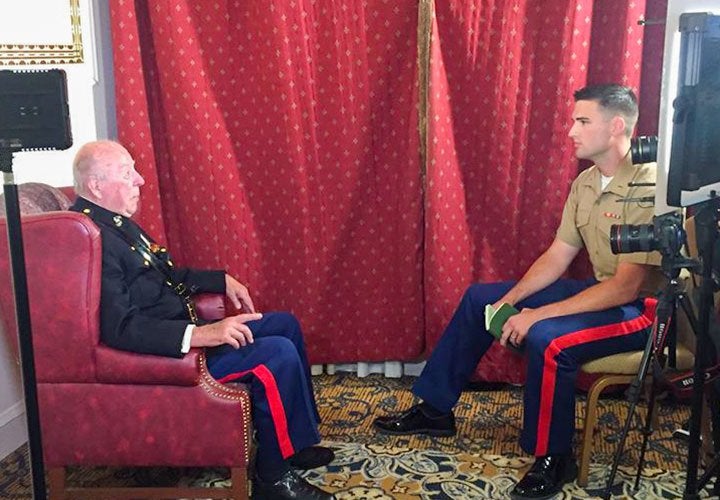Once a Marine, always a Marine. The Marines have used that tired slogan for decades to sell camaraderie and belonging. But as a public affairs officer, I knew the Corps had an ugly history of misogyny, racism, and hazing—all issues that make so many Marines feel persecuted and excluded from that vaunted camaraderie.
Despite these disturbing and often neglected issues, I chose to look past such unacceptable attitudes and focus on the sacrifice, honor, and courage it takes to succeed as a Marine.
I now know that was a mistake.

As a spokesperson, I had the opportunity to tell Marines’ stories in an authentic and honest way. I got to lead using creativity and storytelling to present Marines’ lives in a way that would break through to the public. I loved showing that the Marine Corps can help anyone become a more productive and confident person. I once facilitated CBS This Morning’s visit to Camp Pendleton so they could show the public how women in combat arms jobs successfully served at the tactical level in the largest ground combat unit in the Marine Corps—one of my proudest career moments.
I never thought that I would one day tell my own story in a public venue. I never thought that refusing to lie to the press would be the end of my career in the Corps.
On a late evening in May 2019, my commanding general, who had two stars and 30 years of experience, ordered me to publish a delusive press release announcing the firing of one of his subordinate commanders. A preliminary investigation, conducted a month earlier, had found the commander had committed domestic violence against his spouse—but that’s not what the press release said.
When I learned of it, I immediately advocated for full transparency and complete disclosure of the known facts that led to the officer’s dismissal. Senior staff members instead recommended a banal and evasive press release explaining the general had “lost trust and confidence in the commanding officer’s ability to lead.” That weak, insidious phrase hid that a commissioned officer in charge of a battalion of 500 sons and daughters, a man that the Marine Corps had hand-selected to lead, had committed domestic violence.
My stomach lurched with me from meeting to meeting all day as senior officers continued to push for a press release that obscured the fired officer’s misconduct. Their motivation seemed to be rooted in self-preservation and a dismissive sense of superiority regarding the public’s interest in this issue. I couldn’t understand why senior Marines, the leaders I had venerated, would rush to protect the privacy or livelihood of someone who had betrayed every organizational value espoused by the Marines. For me, this contradicted the values my parents had instilled in me, the values I had sharpened with my classmates at the Naval Academy—my sense of right and wrong.
As the day wore on, I shed my usual Marine Corps skin and boldly advocated for my beliefs. I pushed the envelope and told officers 20 years my senior that they were mistaken and that the Marine Corps had to meet this moment through transparency.
In the end, my seniors won out. Over a marathon day of meetings and draft revisions, I had endured the fight of my young career and lost. I sent out the press release at 8:04 p.m. as ordered.
That night, I barely slept. I tossed and turned, dreading that I had become everything I despised about the Marine Corps. I felt crushed and lost. By the time I got to the office the next morning, I had received a torrent of press queries from reporters trying to figure out the actual reason the 1st Reconnaissance Battalion commander had been sacked. I drew the line at lying to reporters, so I replied that I couldn’t answer their questions and forwarded all press queries to the Marine Corps media desk at the Pentagon.

By the time I left my office for our command’s scheduled staff meeting, I decided I had had enough. I walked into the division headquarters, the same building where a war-weary Marine Corps regrouped after World War II, and sat patiently while the other staff officers briefed. When my time came, I calmly briefed my section’s business, recounted the press release I had sent the night prior, and concluded with my refusal. I told my commanding general I had forwarded all press queries regarding the recent relief of command to higher headquarters because I would not lie to reporters. Bewildered, most of the staff picked up the gravity of the moment, but because leadership had buried the recent firing, only a few other officers understood what had just happened. The general abruptly left at the meeting’s conclusion and I was placed on “administrative leave” until further notice.
What I and everyone else in the room didn’t know at the time of the meeting was that I was suffering from bipolar disorder. Looking back on those frantic days, I find it clear that some of my bravado and willingness to buck the system came from an incipient bout of mania. Though I realized I’d likely wrecked my promising career in the Corps, I could never have imagined the terrible psychological toll that I would pay over the next week.
While on administrative leave, I realized my leadership had isolated me as they figured out how to proceed through this thorny situation. Ramped up from the anxiety one experiences when he loses his career over a single day, I became increasingly manic as I fielded phone calls from the command’s lawyers about my actions. My anxious mania spun into paranoia: I quickly forgot all about the due process afforded to me and descended in a dark panic, obsessing over what the Marine Corps would try to do to me and my family.
After a week, I demanded answers about my status from my superiors and they summoned me to command headquarters. When I arrived, I was not at all surprised to see the command’s judge advocate in the room. I then fielded questions about my handling of the press release and my contact with journalists, as well as all the uniformed public affairs officers I had spoken to about the recent firing. They told me I had never been placed on an administrative leave status and that I couldn’t ask any questions or contact anyone else at the command until I reported to the base hospital. At the meeting’s conclusion, the command ordered me to undergo screening at the base hospital.

Despite the shocking and grueling journey to the hospital, I received excellent psychiatric care from the professionals at Naval Medical Center San Diego. It hurt to receive my diagnosis, and I knew it would take a long time to fully accept and understand it—and an even longer time to recover from such a traumatic experience. It still frustrates me that I was diagnosed because of exploitative and dangerous leadership from my command. In those first moments of receiving my diagnosis, I knew my mental health and care would forever be tied to the damage I experienced in my final days in the Corps.
Once out of the hospital, I returned to my unit to find I had been reassigned to a new job with neither a title nor responsibilities. I was barred from talking to the 50 Marines I had led for the previous three years and from asking any further questions of the command about the incident that had led me to this peculiar employment. I was even more isolated than I’d been on administrative leave.
The limbo soon ended. Along with a career-ending performance evaluation, I was transferred to Wounded Warrior Battalion to undergo the lengthy process for a medical retirement. They told me I had a razor-thin chance to continue to serve if I could convince a medical board that I was fit. But after my experience and the care my command had shown me, I wanted nothing more to do with the Marine Corps.

I am still on the long road of recovery, but I have begun to heal. Unshackled from the intolerant, old boys’ club culture found in the Marine Corps, I have started to feel like I can be myself and contribute in even more meaningful ways to my colleagues, my community, and my family. I am beginning to see that my bipolar disorder is a valuable part of who I am. The same diagnosis that led to my medical retirement—and caused me so much shame—helped me stand up for the values I hold most dear. I now shudder at the person I would have become if I had abandoned my values and simply soldiered on.
Anyone who has served in the Marine Corps understands that, at some point, he or she will be pushed to their limits and encounter major ethical dilemmas. I believe my story can help ensure service members who tell truth to power won’t be unfairly targeted or professionally jettisoned through out-of-date and misunderstood mental health policies. I want officers in positions of power to understand that there is a cost to weaponizing mental health against the people they are supposed to lead. I am sick of reading story after story showing our Marine Corps preying on the principled and vulnerable while rewarding the predators and complicit, unimaginative leaders who tolerate such a misogynistic and exclusionary culture. I want service members and veterans with mental health diagnoses to understand they can live happy and fulfilling lives in and out of uniform.
The Defense Department has tough personnel challenges in the years ahead. The services have struggled with racism, misogyny, bigotry, and a cohort of individuals who think that only a select few are worthy of serving in uniform. These issues will continue to plague our military if both uniformed and civilian leadership don’t stand up for a welcoming and egalitarian meritocracy coupled with real accountability for those who fail to live up to the services’ fundamental principles of honor and respect for all. The Marine Corps can bolster its efforts to build a more inclusive and transparent culture by reassessing its personnel selection for the critical role of inspector general of the Marine Corps. Anyone who directs press officers to stonewall reporters over instances of domestic violence lacks the judgment and moral authority to hold such a critical oversight role. The service can also set the standard for the entire military and mandate transparency in press releases involving any issue of domestic violence or sexual assault.
I do believe that every uniformed service is making strides toward inclusion and welcoming service members from every community. These changes are necessary and enable all service members to lend their talents to the mounting security challenges facing our country. However, old, nasty habits die hard. My experience shows that the military’s practice of writing off complaints or truths because of the mental health conditions of those who speak out is a self-defeating one. It penalizes service members for psychological conditions beyond their control, reinforces a toxic culture that prefers silent struggle to honest disclosure, and permits wrongdoers to evade accountability. None of this helps our military move forward or provides our young officers and enlisted service members a safe, professional work environment.
If I’ve learned anything from my long, crushing departure from the Marine Corps, it’s that transparency and truth-telling will always win in the end. I hope the Marine Corps, an organization I am still proud to represent, chooses honesty and truth-telling in the coming years to root out intransigent cynics and promote the more compassionate, ethical leaders who are ready to build a more inclusive, disciplined, and effective force. My fellow Marines deserve nothing less.
Editors Note: This article first appeared on The War Horse, an award-winning nonprofit news organization educating the public on military service. Subscribe to their newsletter.
